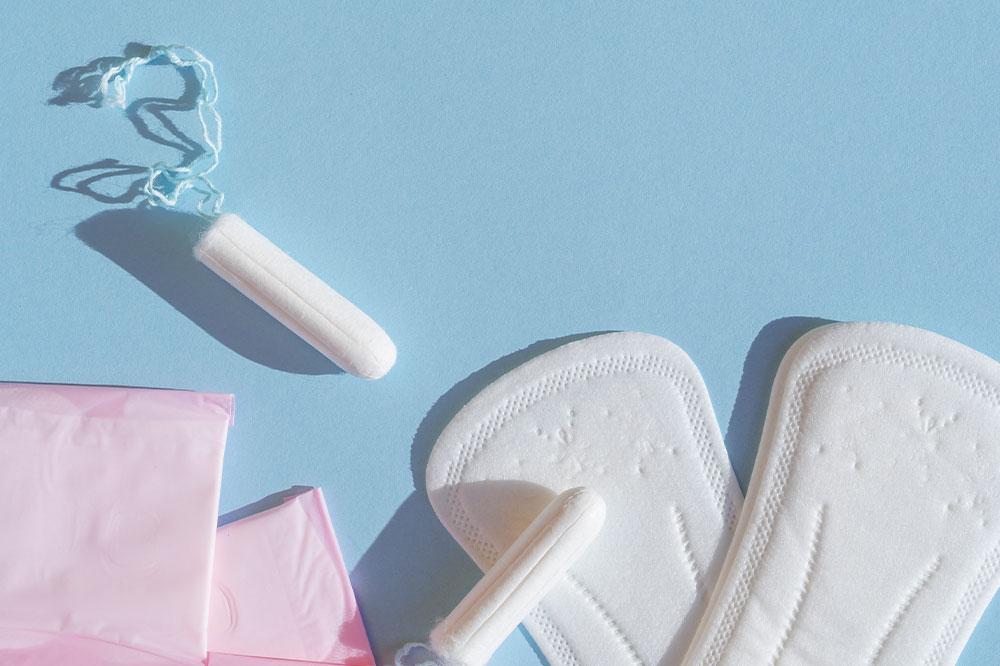
6 tips for better hygiene while using feminine sanitary supplies
Feminine hygiene is often a neglected aspect of general hygiene. When puberty hits, it brings along the menstruation cycle, daily vaginal discharge, and sweat from the sweat glands. So, feminine hygiene is really important as the improper use of feminine sanitary supplies such as tampons, menstruation pads, panty liners, and menstruation cups may increase the risk of infection in the vulvar region. As a result, following some essential feminine hygiene hacks and practices is critical.
Change, clean, and dispose of the sanitary products on time
There is a misconception that using feminine hygiene supplies that are more absorbent is better. This means there is no need to change them frequently. However, using a single tampon, sanitary pad, or menstruation cup for a prolonged time without cleaning or frequently changing it will increase the risk of infection. So, depending on the sanitary product and flow, it is recommended to change it frequently.
- Sanitary pads
Irrespective of the intensity of flow, sanitary pads should be changed every few hours. To prevent the spread of bacteria, make sure to dispose of a used pad by rolling it up and enclosing it in a wrapper or toilet paper. - Tampons
It is advisable to not wear a tampon for more than 8 hours. Ensure to change the tampon every 4 to 8 hours depending on whether the flow is light or heavy. Dispose of the used tampon by wrapping it in toilet paper. - Menstrual cups
These must be cleaned daily after every use. Additionally, menstrual cups should be sanitized after every menstruation cycle by rinsing and soaking them in boiling water for a couple of minutes. These do not have to be disposed of, but need to be replaced every 6 months to 10 years depending on the brand.
Keep the vaginal region clean and dry
Due to sweat and discharge, there is moisture buildup in the vaginal region. Moreover, sanitary pads, tampons, menstruation cups, panty liners, and other such feminine sanitary supplies can cause excessive moisture. So, make sure to pick cotton underwear as the material is breathable. It airs out the excessive moisture buildup and keeps the skin dry and cool. This lowers the risk of infection and the growth of bacteria. Additionally, changing out sanitary products every four hours is advisable.
Don’t use scented or fragrant sanitary products
Using scented or fragrant feminine sanitary products such as feminine wipes, tampons, and menstrual pads may be a trend many would want to follow. However, a lot of these products have ingredients that do more harm than good. Certain states also offer free menstrual products in school. However, it is always best to check the packaging for fragrances, preservatives, glycerin, and other chemicals, which may disrupt the natural pH balance. Scented sanitary products may also increase the risk of yeast infection and bacterial vaginosis. Thus, it is always best to use fragrant-free feminine hygiene supplies.
Never use sponges or gloves to clean the intimate area
The excessive sweating and discharge during menstruation and regular use of feminine sanitary supplies may make one feel like using special paraphernalia for hygiene purposes. However, all that is needed is mild soap and lukewarm water. The skin in and around the intimate area is highly sensitive. It gets easily irritated by the abrasive material of most showering accessories such as loofahs, gloves, sponges, and poufs. Moreover, all of these often have bacterial buildup, making them at a high risk of causing infections. So, avoid using such female hygiene supplies for cleaning the vaginal area.
Avoid douching
Many individuals often end up douching the intimate area, especially during menstruation to wash away unpleasant odor and get relief from the irritation caused by the use of feminine sanitary supplies. However, the vagina has its own self-cleaning mechanism. It is capable of regulating its acidity levels in order to prevent the growth of yeast and bacteria. This is why douching is not recommended. It destroys the natural pH balance, leading to the disruption of good bacteria. This may cause irritation and inflammation in the vaginal region.
Take precautions while wiping
It is generally recommended to wipe from front to back. However, not many are not aware that the front-to-back rule is only for after peeing. In other cases, especially during menstruation, it is best to use different papers for the rectum and the vaginal areas. Thus, it is best to wipe one area and then throw away the used paper. Use a new one to wipe the other area and wear a clean and fresh sanitary product. This way, there will be fewer chances of contamination and infection. Moreover, this will lower the risk of urinary tract infections (UTIs).




